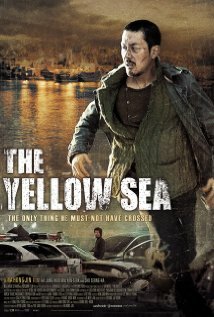You can officially add Na Hong-jin to the growing list of South Korean directors outdoing ninety-five percent of their Hollywood counterparts. After debuting with the critically acclaimed The Chaser in 2009, Na’s follow-up is an artful, absorbing and exceedingly violent crime thriller called The Yellow Sea, a film that bears all the style and splatter that characterizes the work of Park Chan-wook (Oldboy), Bong Joon-ho (The Host) and Kim Ji-Woon (I Saw The Devil), filmmakers who have made South Korean cinema one of the most exciting national cinemas out of Asia, if not the entire world. Beginning as a suspenseful film noir before exploding with violent, frenetic mayhem, The Yellow Sea is an awesome genre exercise with a bitter undercurrent of social commentary to go along with it.
Ku-Nam (Ha Jung-woo) is a down-on-his-luck cab driver living in Yanbian, a Korean prefecture in North-Eastern China. Chronically in debt, his wife left for South Korea a year ago, but her promise of sending money back has gone unfulfilled. Plagued by nightmares that his wayward spouse is having an affair, Ku-Nam spends most of his time drinking or loosing at Mah-jong in dingy gambling halls, while his elderly mother is left to look after her son’s infant child. An opportunity to finally make some money is presented by a local gangster Myun-Ga (Kim Yun-seok), who offers Ku-Nam $60 000 and the chance to travel to South Korea to track down his wife. All he has to do is kill somebody. Both Kim and Ha previously starred in The Chaser, and both are excellent here; the bearded Kim is especially watchable as the jovial Myun, a gangster whose easy going manner masks his grisly ability with an axe.
The first act of the film unfolds slowly. Arriving covertly in Seoul across the eponymous yellow sea, our would-be assassin nervously scopes out his target’s apartment, while also searching for his wife, who he begins to fear may have fallen victim to a violent crime of her own. Deliberately paced and often wordless, the early parts of the film are classic neo-noir, with Na’s high definition digital cinematography recalling Michael Mann’s Collateral. Arguably it goes on a little long, especially considering the version I saw was the 140-minute director’s cut, itself shortened from the 156 minute Korean theatrical version. That said, this lengthy setup is the eerie calm before the storm: on the night of the murder, things go horribly awry and the film transitions suddenly from a slow burning mood piece to a high-octane action picture. It’s gruesome, exciting and scarcely ever lets up.

Betrayed and bloodied, Ku-Nam suddenly finds himself on the run, with the cops, the South Korean mafia and Myun and the knife-wielding Chinese underworld not far behind. All of a sudden, The Yellow Sea becomes a non-stop Fugitive style chase movie, one with pursuit scenes so riveting and audaciously lengthy that it is only in the brief moments of quiet between bursts of running that you realise you have completely forgotten to breath. Na does occasionally over-edit his action, and his use of shaky-cam renders two potentially excellent car chases practically unintelligible. But most of the time, the sheer intensity shines through.
The fight scenes are even better. The punishment inflected on bodies in this film – not by guns but by knives and hatchets – is certainly enough to kill most mortals, yet Na’s characters push on with Terminator style endurance, be it because of their burning desire to live or through the sheer power of badassery. This is an enormously bloody movie, but never indulgently so; Na’s excellent fight choreography and creative kill concepts keep things exciting, as he pitches dozens of armed assailants brawling against a single man. At other moments he chooses to skip the violence entirely, opting to cut away, and then back again a few moments later, to a room once full once of people that is now littered with corpses. The second and third acts also reveal an unexpected amount of gallows humour, as Na blurs the tonal line between carnage and comedy in a way that only the South Korean’s can.
But even as Na unleashes progressively more insane and exciting scenes of action, he also explores and plays with contemporary themes of emasculation and urban resettlement. Ku-Nam, the drunken cuckold, is only driven to murder in the first place because he is unable to provide for his family. The suit-and-tie wearing Korean crime-king Kim Tae-won (Lee Chul-min) cowers before the unflinchingly efficient Myun; his failings as a gangster reflective of his failings as a man. Meanwhile, many aspects of the film play like a frightened parable about immigration. Killers arrive by boat hidden amongst migrants, while Koreans spit the world “Joseonjok” – which means a Chinese person of Korean descent – as if it were a racial slur. The city, already filthy, crime-ridden and packed to the brim, does not want these people, and soon strips them of any dignity or humanity they may once have possessed.

The visceral nature of the violence in The Yellow Sea reveals its ultimate thesis. This is a film about the lengths men will go. For money. For pride. For survival. Its characters – both hero and villains – are animals, driven by base instincts and utterly unhampered by conscience. It is no coincidence that the fight sequences so often descend into senseless melees, where men swing blindly at each other, attacking from all sides. They are rabid dogs, fighting tooth and nail. And all for a few measly scraps.
The Yellow Sea recently played at the Fantastic Asia Film Festival in Melbourne. It opens in selection Australian cinemas on December 1.
 Follow the author Tom Clift on Twitter.
Follow the author Tom Clift on Twitter.




![Joint Security Area [2000] (KOFFIA Review) Joint Security Area [2000] (KOFFIA Review)](/wp-content/uploads/jsathumb.jpg)

![The Recipe [2010] (BAFF Review) The Recipe [2010] (BAFF Review)](/wp-content/uploads/photo1354581-150x150.jpg)









